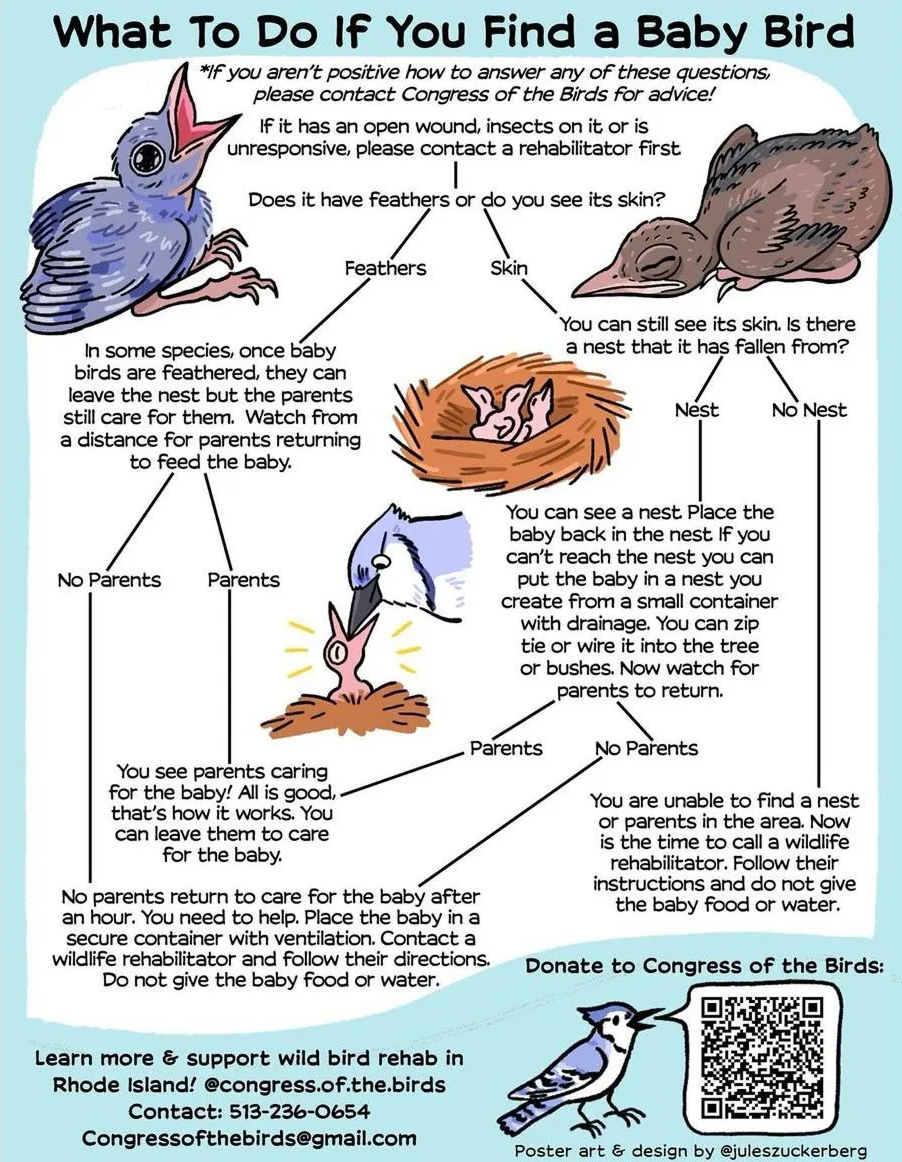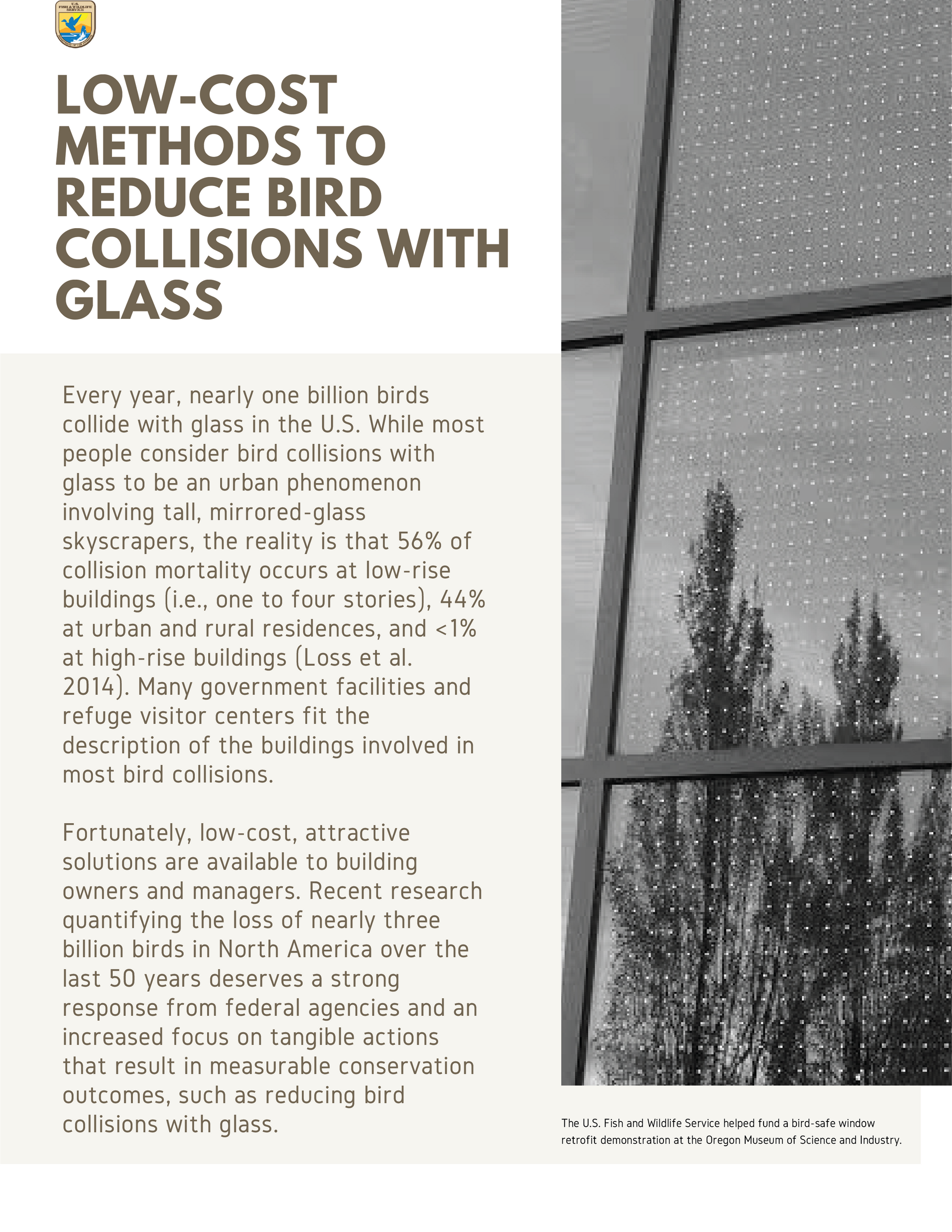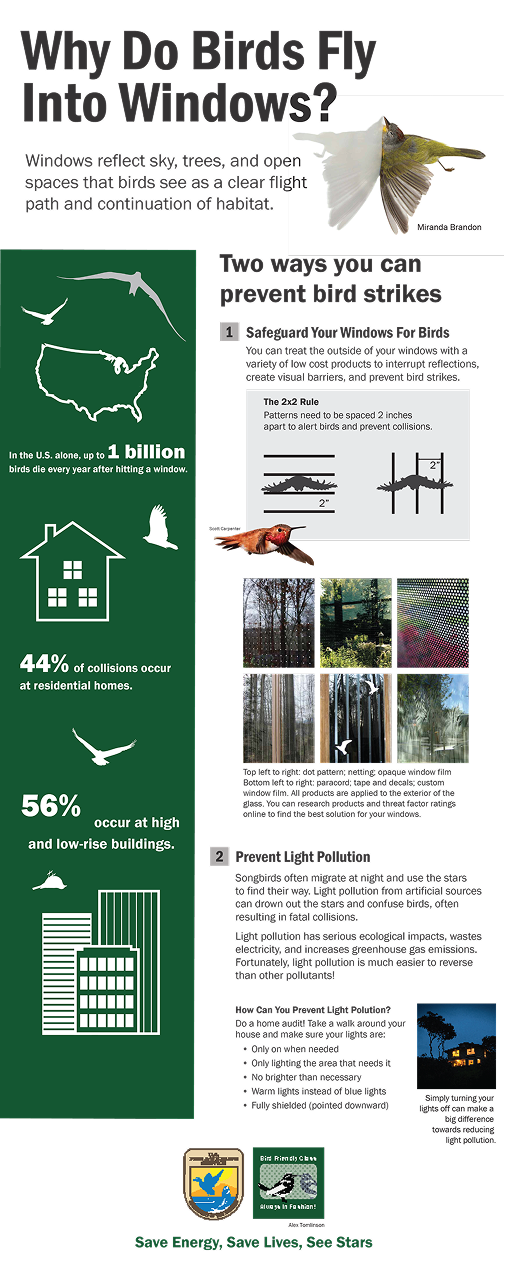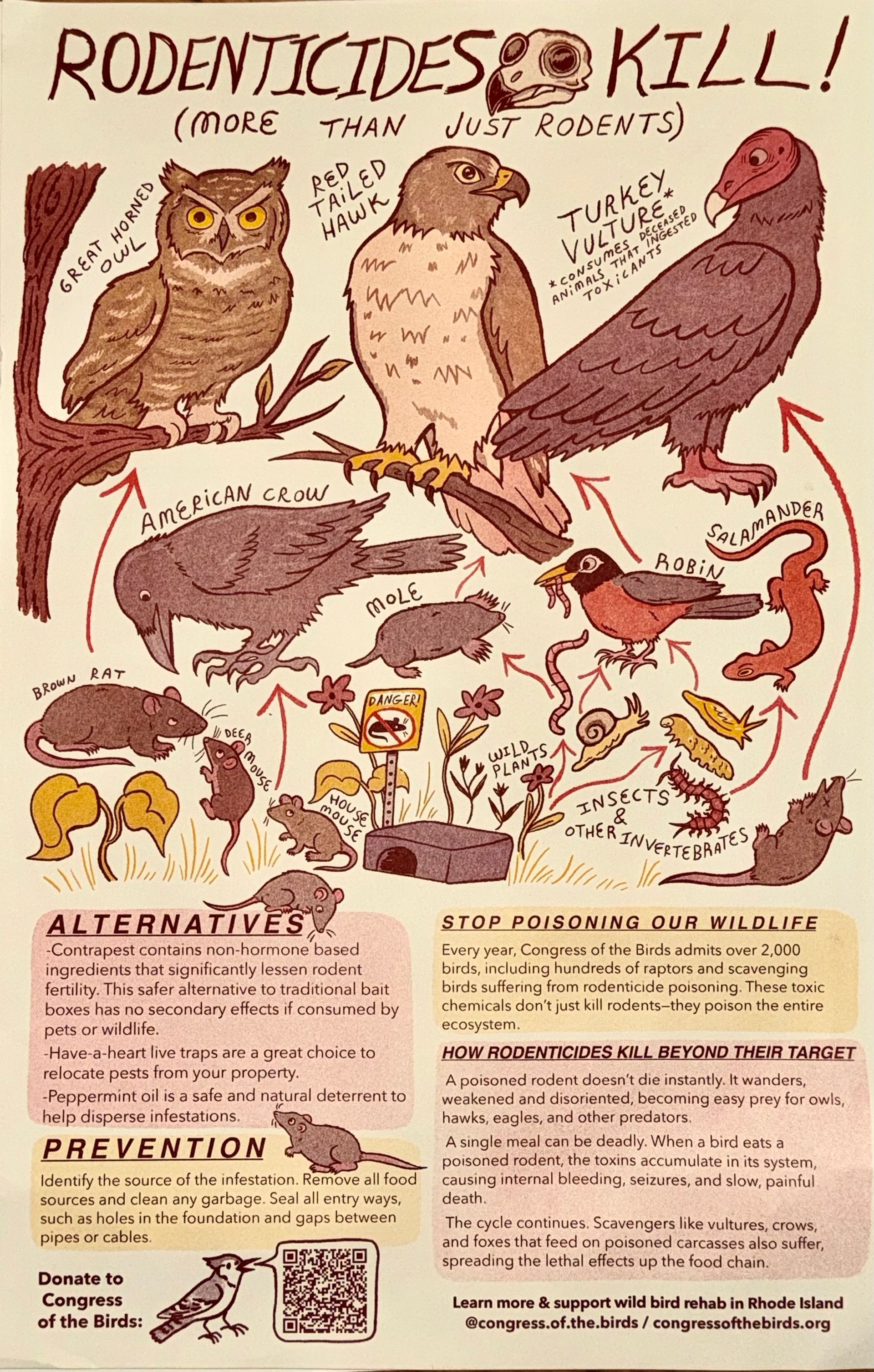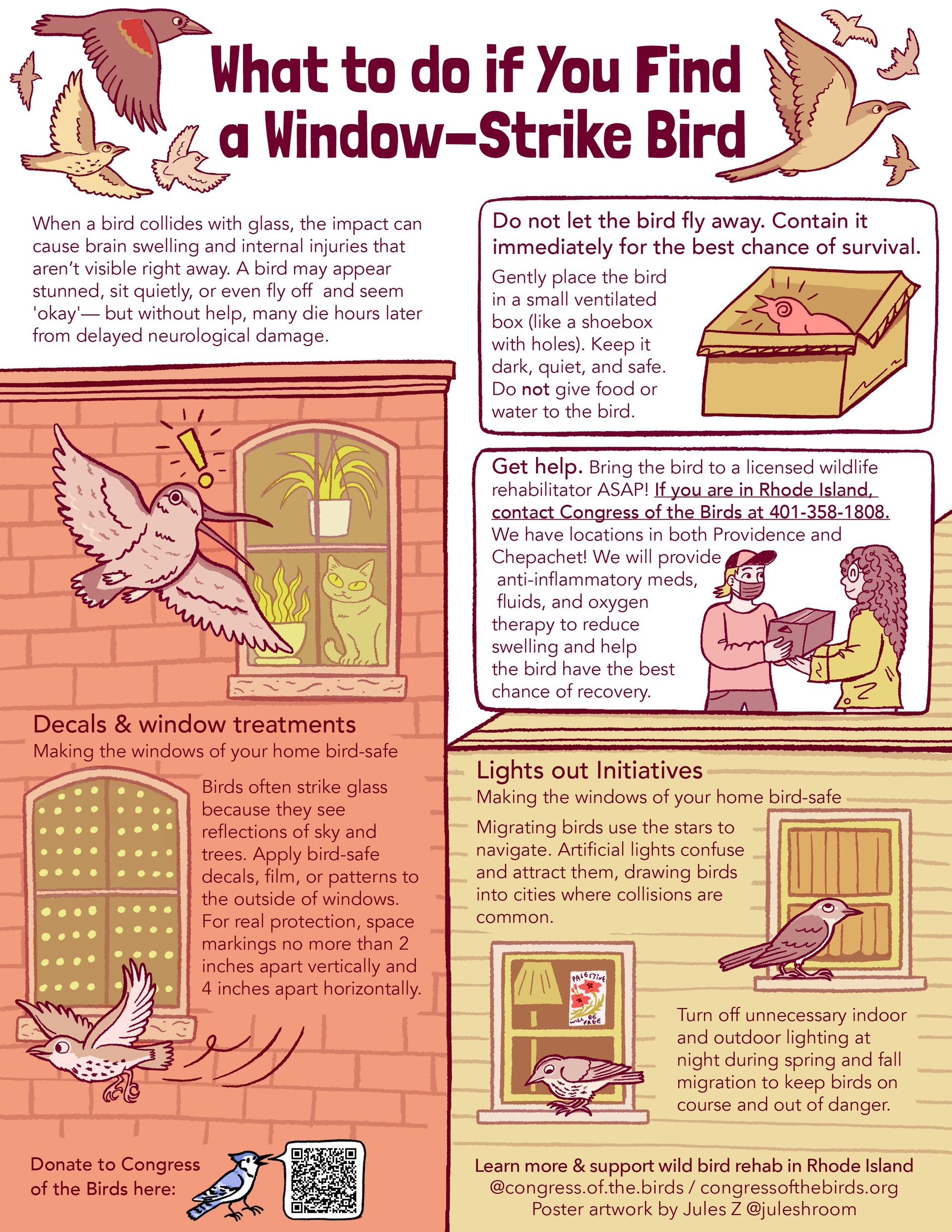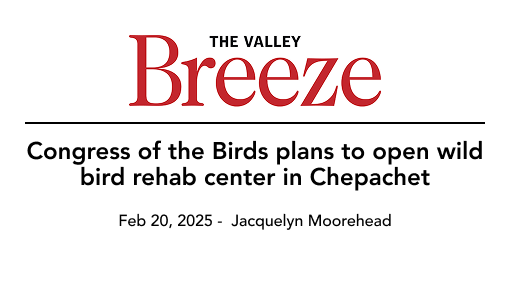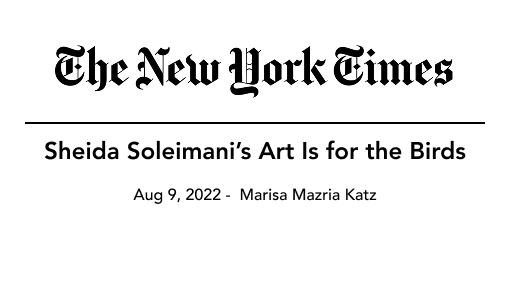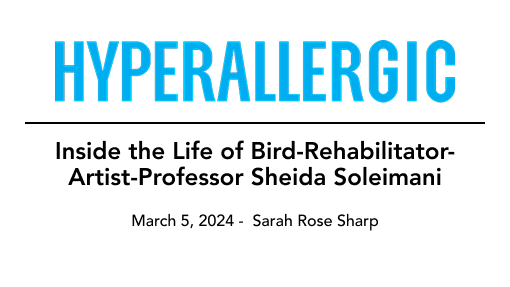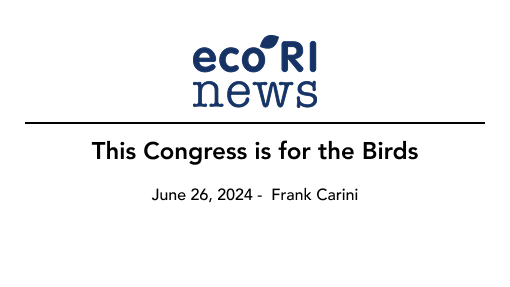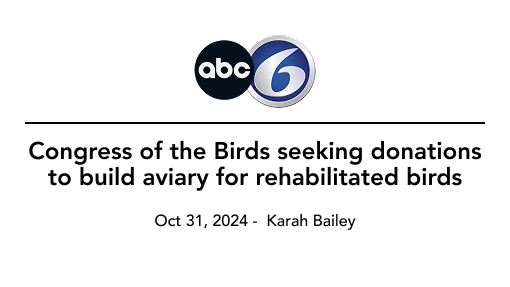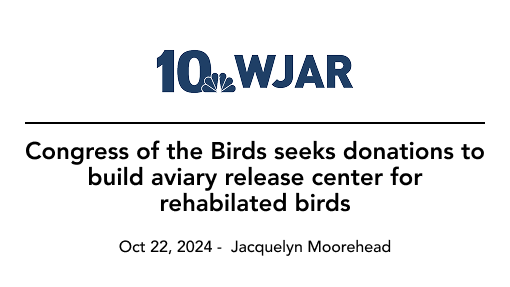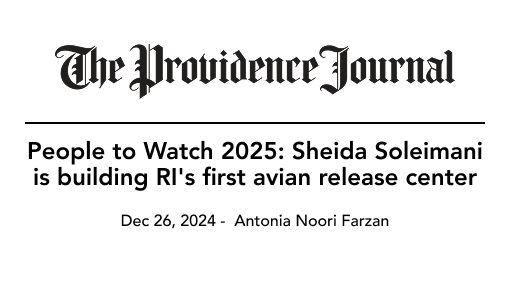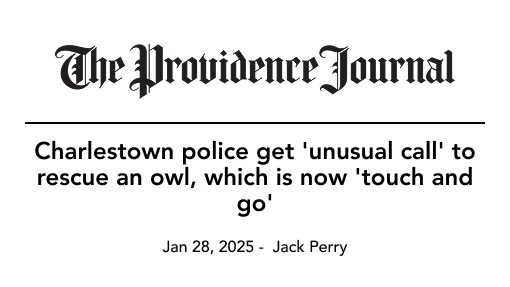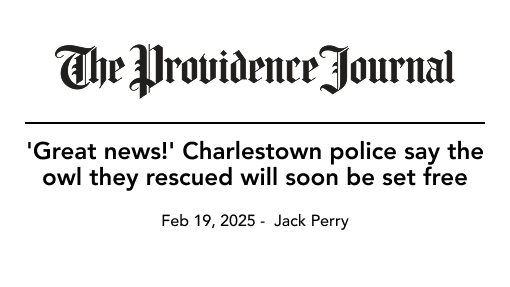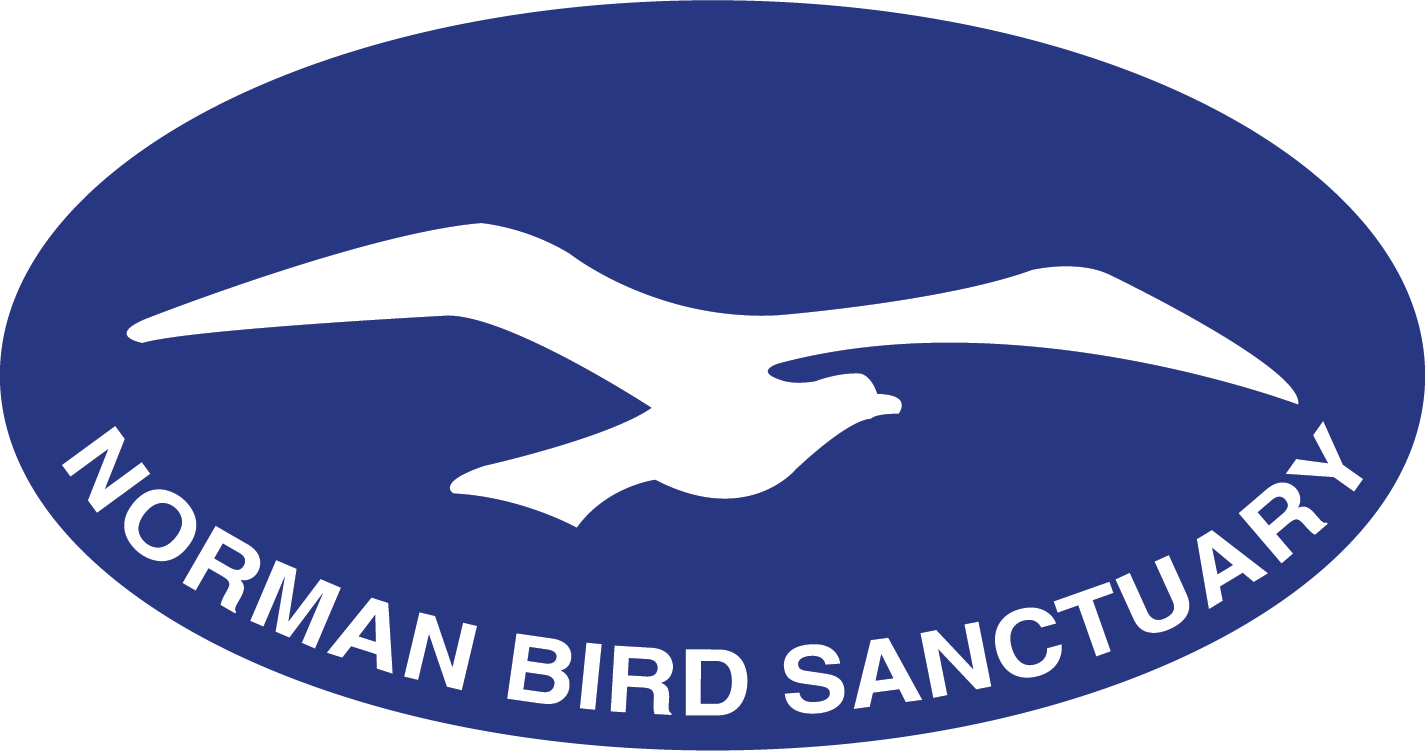About Us (old copy)
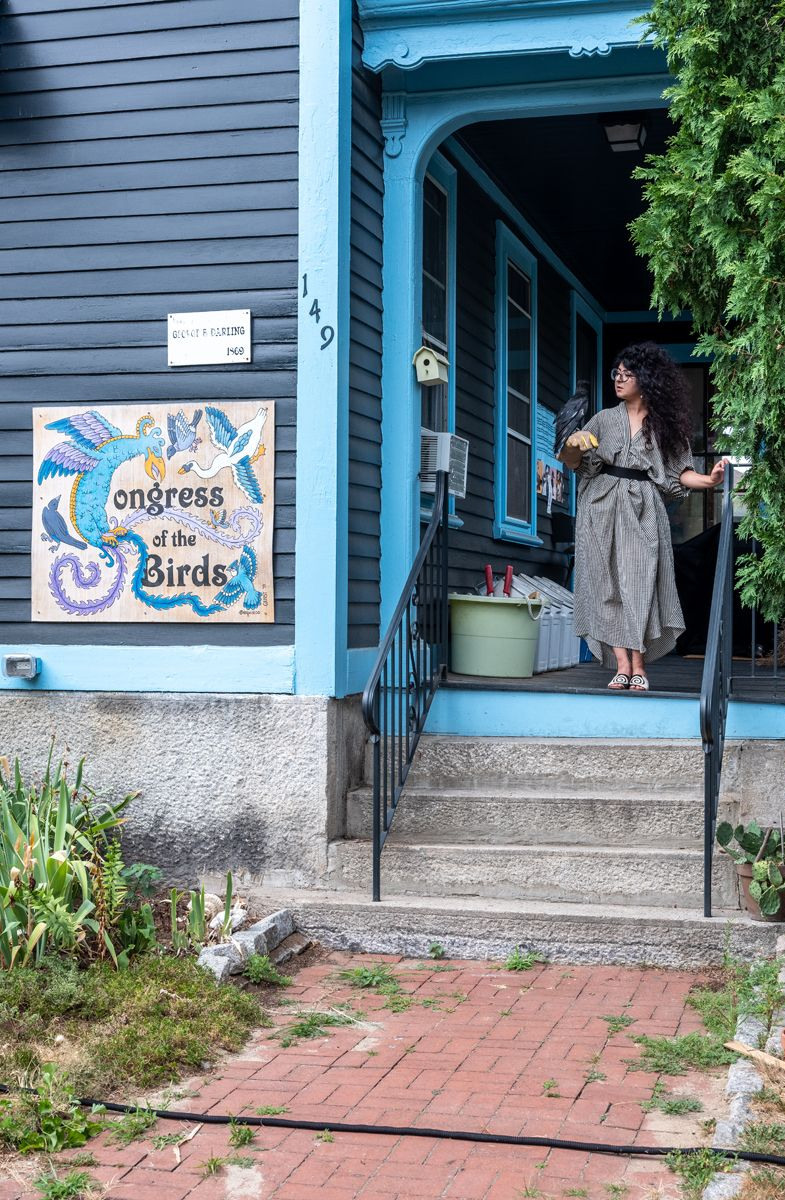
Birds that are wild are meant to be free in the wild.
At Congress of the Birds, we rehabilitate with release in mind. We are both state licensed and federally permitted to care for all species of wild birds at our clinic. Through providing both medical and rehabilitative care, our center treats upwards of 1,000 avian patients every year, and provides triage and stabilization for ALL species of wild animals. We work alongside a team of volunteers who help care for our avian patients, as well as maintaining our facilities.
Sheida Soleimani started rehabbing wildlife with her maman, a political refugee from Iran, who was a nurse back in their home country. After seeking asylum and moving to the United States, her mother was unable to continue her practice as a nurse. Wanting to continue to help and nurture, she found a local wildlife rehab center, where she began to volunteer. Sheida was raised around the wild animals her mother would rehabilitate, and through this, grew to pursue it as a passion of her own.
Throughout college and grad school, while studying to receive her degrees in art, Sheida continued to volunteer as a bird rehabilitator and would rehab a handful of wild birds out of the bathroom of her apartment every year. The birds became a primary source in her artwork, and after graduating with an MFA from Cranbrook Academy of Art in 2015, she moved to Rhode Island to teach at the Rhode Island School of Design. While getting settled into a new life in Rhode Island, she realized that she missed caring for birds. In 2016, she received her state rehabilitation license, and began rehabilitating wild birds out of the basement of her rental carriage house. The rest is history.
When she joined the visual arts faculty at Brandeis University in 2018, Sheida founded Congress of the Birds in her home on Congress Avenue in Providence, RI. Having a larger space meant that she could treat more avian patients, and the intake numbers grew! In 2020, Sheida received her Federal Migratory Bird Rehabilitation Permit, and The Providence facility houses a fully-equipped wildlife clinic, complete with an oxygen concentrator and chamber, incubator for hatchling and debilitated birds, washing station for waterproofing baths, seabird and waterfowl tub, species specific enclosures, microscopy and blood testing equipment, and four large outdoor aviaries/flight enclosures for birds of various sizes.
Spring 2024 Land Center Update!
In addition to the Providence facility, Congress of the Birds was lucky enough to receive a large donation of land, to allow us to have a ‘release center’ for our wild patients after their in-clinic care is complete. The Congress of the Birds ‘Land Center’ is located on 42 secluded forest acres dedicated not only to rehabilitation and release of birds, but also to providing opportunities for students to engage with wildlife up close, and to reflect their encounters through a variety of arts and education experiences and practices.

At Congress of the Birds, we rehabilitate with release in mind. As a state-licensed and federally permitted wildlife rehabilitation center, we care for all species of wild birds and provide triage and stabilization for all species of wild animals in the New England area. Our dedicated team of staff and volunteers help us care for patients and maintain our 24 hour triage clinic in Providence, as well as our rehabilitation and release center in Chepachet. As the only avian-specific rehabilitation facility in Rhode Island with an onsite release center,
our clinic treats over 1,000 avian patients annually with the goal of returning them to their natural habitats.
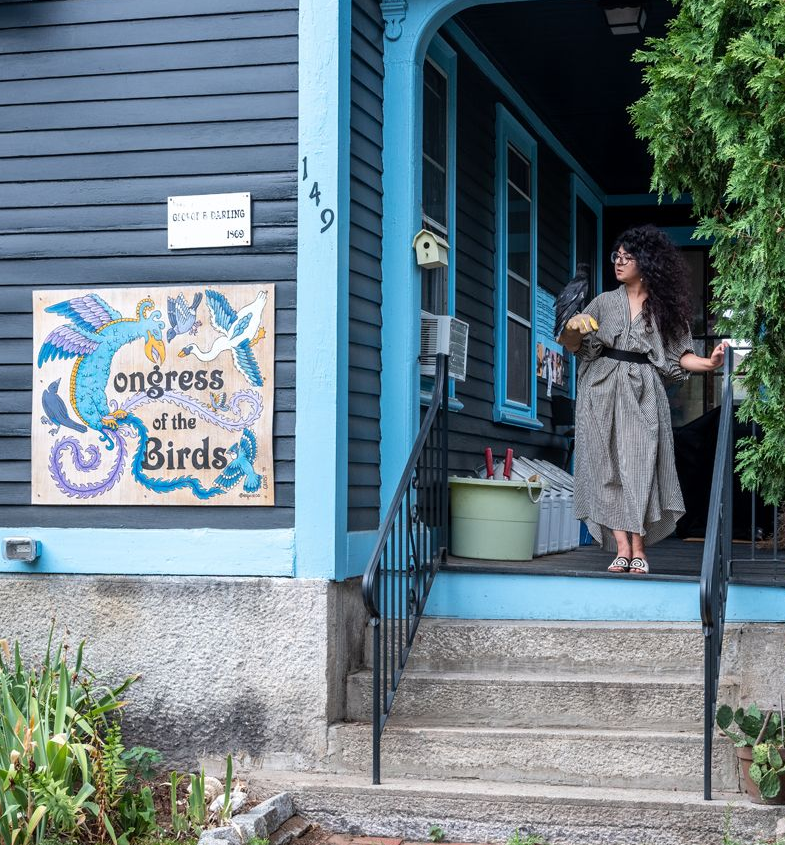
Our Mission
To rehabilitate every wild bird in need, and establish a compassionate environment for wild birds through advocacy, education, and art.
Our Values
Wild Birds Should be Free in the Wild
Our rehabilitation practices prioritize successful release into the wild. We follow the principle of “do no harm.” Working closely with veterinarians, we uphold the highest standards of care. We aim to ensure that birds and other animals remain reliant on their natural instincts, improving their chances to survive in their natural habitat.
Wildlife Rehabilitation as a Modality for Education, Art, and Community Building
We value non-traditional ways of learning, and find that art can be an accessible way to visualize, observe, and learn about the world around us. We prioritize creativity, inclusion, diversity, and radical acceptance in our community building and connecting.
Interdependence of All Life
We acknowledge that the work we do for birds and other wildlife is not because of an innate human superiority, but because the health of our ecosystem depends upon our harmonious relationships. As human life continues to exacerbate harm on the global climate, we believe that addressing this issue is dependent upon a shift in mindset, where we acknowledge and emphasize the interdependency of life on our planet.

Get Involved
Volunteer
Each Spring we host training classes to get our volunteers ready for the busy baby season, as well as one-on-one sessions throughout the year. We also need wildlife transporters to help rescue animals across the northeast. By joining our transport network, you’ll receive notifications when an animal needs help. If volunteering interests you, please reach out to Jen at
congressofthebirds@gmail.com to get started!
Join Our Patreon
If you can’t volunteer but still want to help, consider joining our
Patreon for as little as $5/month. Get special updates, behind-the-scenes access, and exclusive live feeds.
Donate or Help with Supplies
We rely on fundraisers, grants, and private donations to care for our patients. Your tax-deductible
donation gives wild animals a second chance at life. We also welcome
supply donations—from simple items like paper towels to specialized medical equipment.
Shop our Merch
Show your support with our official Congress of the Birds stickers, shirts, and more! Visit our
merch store, where we have items designed by local artists and community members.

Education (old copy)

Clever Corvids Program
The Clever Corvids program is a single-visit program that can be adapted to grade levels 1 through 12. During this program, students learn about corvid adaptations through discussion and various activities with biofacts. Students have a chance to see these adaptations in our live birds as our corvids work on problem solving via puzzles, obstacles, and route finding; at the same time, students will also learn about the social and natural dynamics of these species as they interact with each other and their surrounding environment.
Avian Art & Activism
This is our flagship educational program. As an art educator, environmental activist, and federally licensed wildlife rehabilitator with more than fifteen years of experience, Professor Sheida Soleimani will lead students through two 1-hour courses that can be done on the same day, or on two separate visits to the facility. Before students meet the birds, Professor Soleimani presents the challenges that birds—and particularly corvids—face in urban environments like our home city of Providence. Drawing upon evidence from cases that Soleimani has treated herself, as well as broader concerning data, she discusses facts including the leading causes of death for corvids in cities and connects these deaths to the ways built environments are designed and the ways that humans inhabit them. The class will then discuss how art as a form of activism can be used to teach our communities better ways of designing and inhabiting these built environments. Each program is presented with live, non-releasable birds and includes a slideshow presentation detailing the individual bird’s history in addition to how the bird fits into the local ecosystem. As in the Clever Corvids program, following the presentation and discussion, students will have an opportunity to see our live birds working on puzzles and solving problems, while learning about how these species interact with the local environment. During the second visit, students/artists will discuss their ideas for their art pieces, and will get to meet both of our ravens up close and personal, who will sit on a perch (with jesses and leash) and be the live subjects for figure drawings, photographs, and research studies for artists.
Federal and state education permits allow us to house and work with birds that can not be returned to their natural habitats, provided we share them through educational presentations. These particular birds have become ambassadors and have helped us to educate the public on ways we can better co-exist with all wildlife within our very own backyards. Congress of the Birds is home to two Common Ravens who are unfortunately unable to be released due to human habituation. We run a variety of educational programs with our ravens.
The Migratory Bird Treaty Act (MBTA) prohibits the take (including killing, capturing, selling, trading, and transport) of protected migratory bird species without prior authorization by the Department of Interior U.S. Fish and Wildlife Service.
If you find an injured or orphaned baby bird, please CALL A WILDLIFE REHABILITATOR immediately. It is illegal to keep these birds as pets without the proper permitting and facilities.
Congress of the Birds: Education Programming
Congress of the Birds offers innovative education programs to meet the needs and interests of a variety of audiences. All COTB programs happen on site, and include the presentation of non-releasable corvids to increase engagement and understanding of these birds. Specific programs have been developed for:
- Students of all ages
- Special interest groups
- Artists
Programs can be adapted to fit specific curriculum or classroom objectives. If you are interested in our education programs, please get in touch with us via email at congressofthebirds@gmail.com.
*Meet*
You might see videos of people on Tik-Tok, Instagram, or other forms of social media that have ‘pet’ crows and ravens. In the videos, they seem cute! People are talking to them, brushing them, giving them treats, and you might get the idea that it’s okay to keep a crow or raven if you find one. Please remember that wild birds are meant to be wild! If you find an injured bird, please do not attempt to keep it as a pet! Contact a wildlife rehabilitator ASAP! Our two education birds were kept by members of the public and unfortunately became imprinted onto people,
Education

Our federal and state education permits allow us to house and care for birds that cannot be released, providing unique opportunities for public education. These non-releasable birds—such as our two resident Common Ravens—serve as ambassadors, helping us teach communities how to better coexist with wildlife.
Note: The Migratory Bird Treaty Act (MBTA) prohibits the possession or care of wild migratory birds without proper authorization. If you find an injured or orphaned bird, please contact a licensed wildlife rehabilitator immediately.
All of our posters were created by Jules Z, our inaugural Congress of the Birds Artist in Resident. Follow them on Instagram at @juleshroom
Education Programming
Congress of the Birds offers engaging, on-site educational programs featuring our ambassador corvids. We can adapt our curriculum to meet specific educational goals. To schedule a program, email us at congressofthebirds@gmail.com. Programs are tailored for:
- Students of all ages
- Special interest groups
- Artists
Clever Corvids
A single-visit program exploring corvid adaptations through discussion and various activities with biofacts. Students have a chance to observe as our corvids work on problem solving via puzzles, obstacles, and route finding. At the same time, students will also learn about the social dynamics of these species as the birds interact with each other and their surrounding environment.
This program can be adapted for grades 1-12.
Avian Art & Activism
Our flagship program, led by Professor Sheida Soleimani, combines art, ecology, and activism. Students participate in two one-hour sessions. The first session explores:
- The challenges birds face in urban environments
- How art can inspire environmental change
- Live demonstrations featuring our ambassador corvids
The second session offers students an opportunity for figure drawing and artistic study of our ravens, promoting creative reflection on coexistence and conservation.
Shop our Merch
Show your support with our official Congress of the Birds stickers, shirts, and more! Visit our
merch store to get yours.
Care about wildlife as much as we do? We are always looking for volunteers! Each Spring we host training classes to get our volunteers ready for the busy baby season, as well as one-on-one sessions throughout the year. We also need wildlife transporters to help rescue animals across the northeast. By joining our transport network, you’ll receive notifications when an animal needs help. If volunteering interests you, please reach out to Jen at
congressofthebirds@gmail.com to get started!
Volunteer

Meet Our Flock
Zola
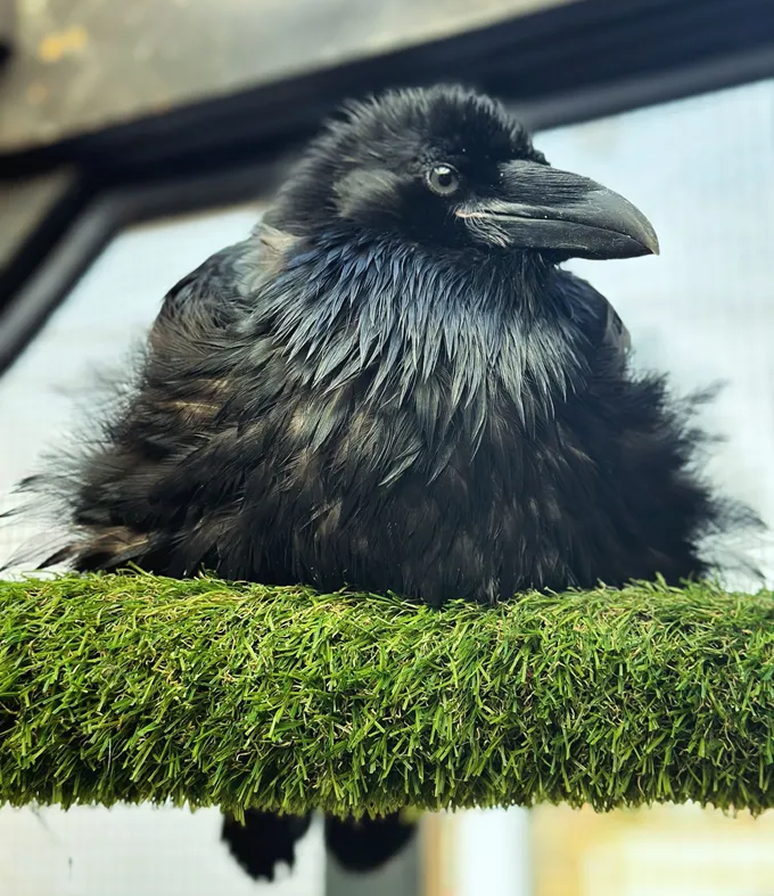
Hatched in 2023, Zola is a common raven that arrived to us with clear indications that someone had attempted to keep her as a pet, and after being unable to care for her, set her loose. Every attempt was made to re-wild her, including pairing her with our other raven in care, but it became clear that she had already become habituated to humans in her time before coming to Congress of the Birds.
Zola is very talkative, and enjoys doing puzzles, caching her food in the slats of wood in her enclosure, and chasing balls!
Zia
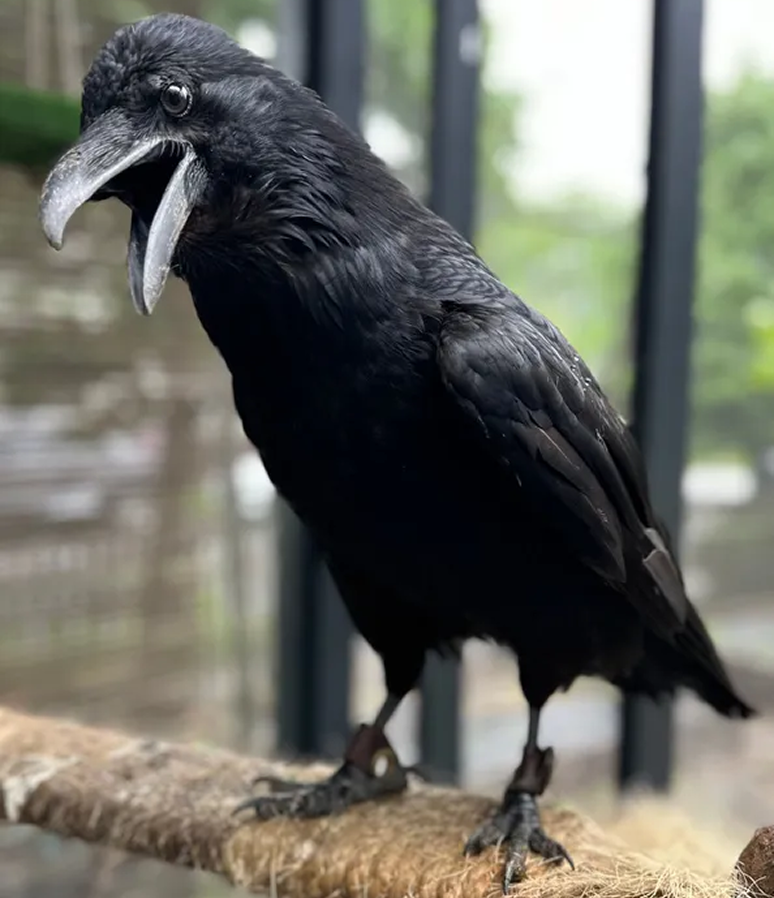
In June 2023, Zia walked right up to the individual that found him, and into a carrier. We assume that Zia, a common raven, had been raised by a human who had then attempted to ‘release’ him without proper knowledge of how corvids imprint upon people. When he came into our care, he was severely emaciated, with various metabolic issues from poor nutrition. Zia received months in care, and unfortunately, our multiple attempts to ‘re-wild’ him were unsuccessful.
Now, Zia enjoys spending time with his ‘sister’ Zola, eating eyeballs, grapes, and ripping cardboard.
Sheida Soleimani
Founder / Executive Director
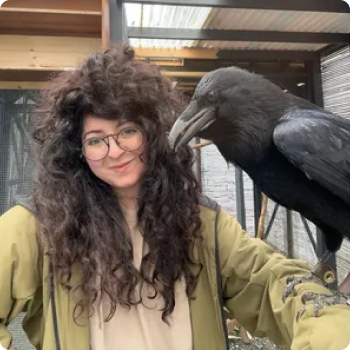
Sheida Soleimani is an Iranian-American artist, educator, activist, and federally and state-licensed migratory bird rehabilitator. She specializes in the care of all species of wild birds, and has rehabilitated thousands of patients over the past decade. Soleimani founded Congress of the Birds in the basement of her home, slowly growing it into a small but vital rehabilitation clinic; in 2024, it formally became a nonprofit dedicated to providing medical treatment, rehabilitation, and safe release for injured wild birds.
Her artistic practice runs alongside this work of care. The daughter of political refugees who fled Iran in the early 1980s, Soleimani uses photography, sculpture, and installation to examine the intertwined histories of violence linking Iran, the United States, and the broader Middle East. Her work is held in the permanent collections of the Guggenheim Museum, the Museum of Fine Arts Boston, the Pennsylvania Academy of the Fine Arts, the MIT List Visual Arts Center, and Kadist Paris. She is also an Associate Professor of Studio Art at Brandeis University.
Thalia Field
Board Secretary
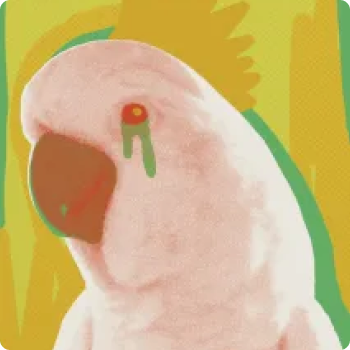
Thalia is an American author known for innovative fiction and interdisciplinary literature. She teaches experimental fiction and interdisciplinary performance at Brown University, where she is the Adele K Seaver Professor of Literary Arts. Books include Personhood, Bird Lovers, Backyard and Experimental Animals: A Reality Fiction. Performance versions of her books directed and produced by Ben Williams can be found for free streaming at www.category-other.com
Thalia is a Founding Board Member of Congress of the Birds.
Jonathan Schroeder
Board Member
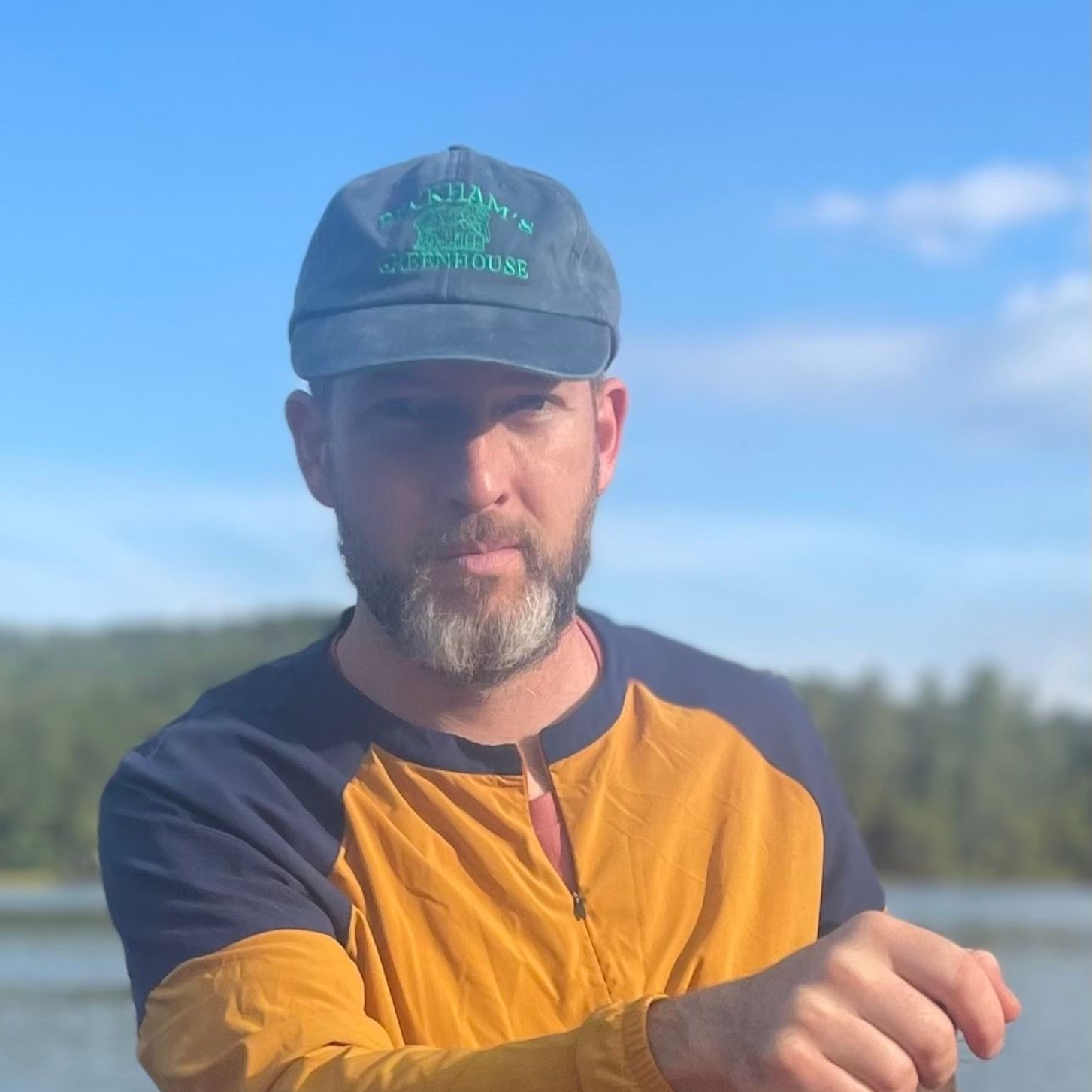
Jonathan is a historian and critic whose work focuses on the histories of human and nonhuman captivity. He teaches at the Rhode Island School of Design and is currently a fellow at the Harvard Radcliffe Institute, where he is writing an eleven-generation biography of Harriet and John Jacobs. This work expands upon his auto/biographical edition of John Jacobs’s lost 1855 freedom narrative, The United States Governed by Six Hundred Thousand Despots: A True Tale of Slavery, which was republished in 2024 and profiled in the New York Times, Boston Globe, All Things Considered, and elsewhere.
Jonathan is a co-founder of Congress of the Birds.
Zachary Rosemere
Board Chair

Long dedicated to environmental preservation, Zach holds a BS in Environmental Science and MS in Sustainability Science from UMass Amherst where he focused on renewable energy. Zach is a Project Developer for the RISE Group, installing solar PV for commercial, municipal, and nonprofit clients throughout the northeast.
Zach’s passion for wildlife and ecosystem health led him to Congress of the Birds, where he began as a volunteer in 2023.
Randelle Boots
Board Member
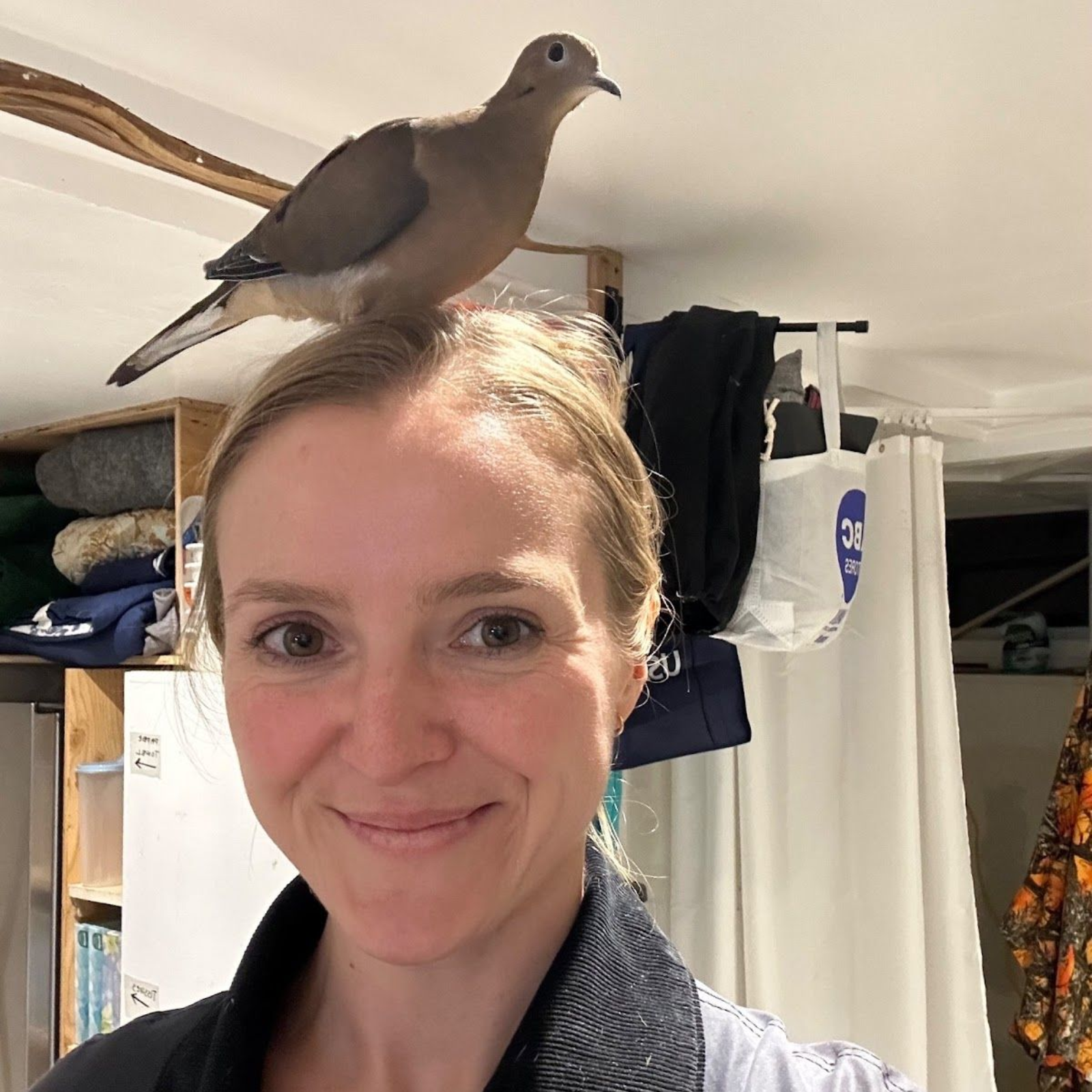
Randelle received her BA in Environmental Studies, with a minor in Economics and a Sustainability Certificate from Wellesley College. She went on to get a JD from Vermont Law School where she focused on environmental and energy law. Randelle now works as an attorney in the renewable energy and battery storage field for Black Bear Energy. Her volunteer work spans organizations such as the Crisis Text Line, Handsome Dan's Rescue, and the Wildlife Rehabilitators Association of Rhode Island. Randelle enjoys exploring nature with her two nieces and two nephews and she has the most wonderful rescue pit-mix named Rose.
Cristina M DiChiera
Board Member
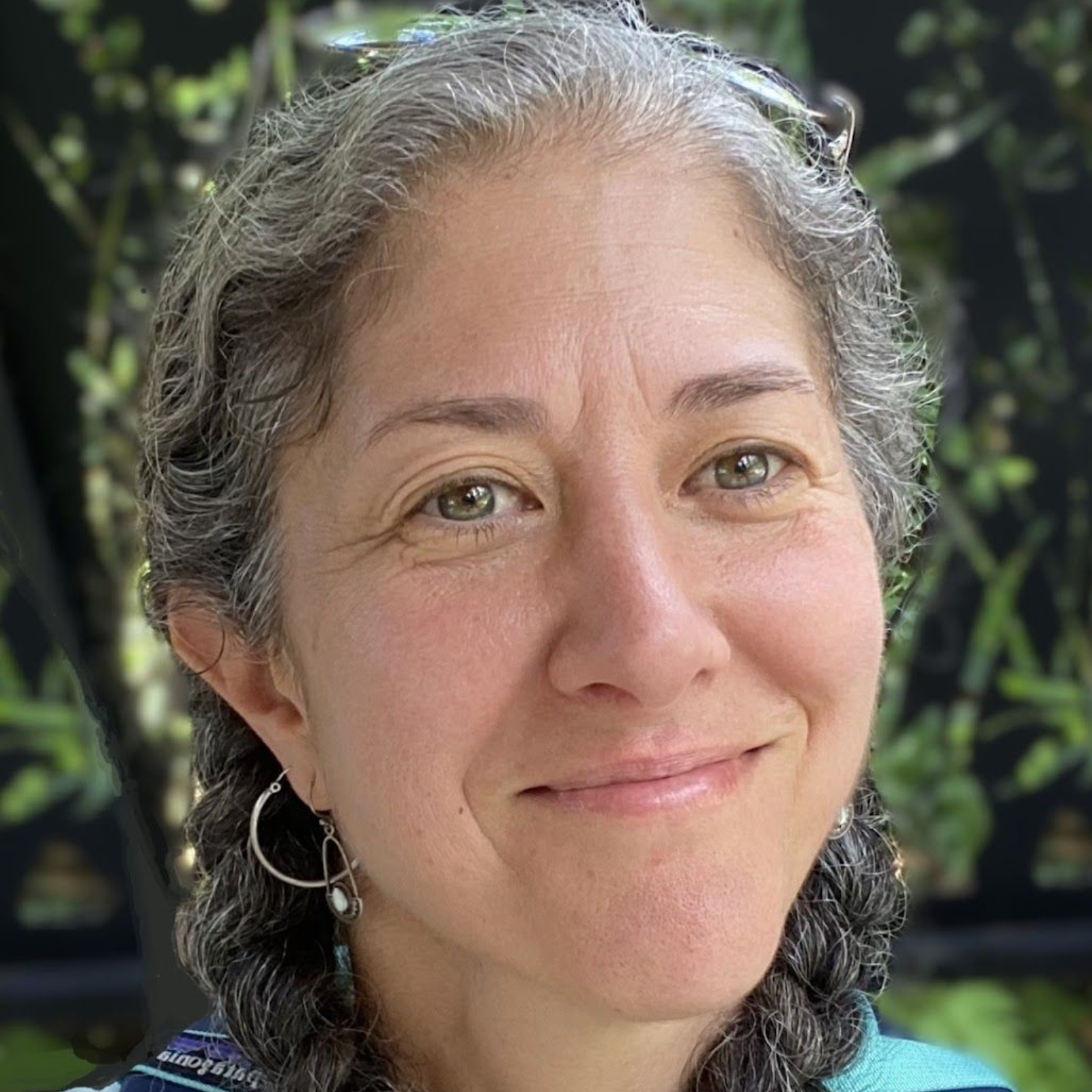
Cristina’s career spans over 25 years of leadership roles in nonprofit, government, and academic sectors. She has experience in every aspect of nonprofit management and is passionate about connecting people with resources to help them achieve their goals. She established her independent consultancy in 2017 to offer contract-based services, such as public art assessment and planning, project management, strategic planning, grant writing, marketing and communications. She is a founding member of the Urban Greens Food Cooperative and serves as a Trustee of Detroit Opera, an organization founded by her parents.
She lives in and cares for an old New England farmhouse on five acres in Foster, RI with her husband, daughter, a friendly dog and aggressive chickens.
Diana Ducharme
Board Member
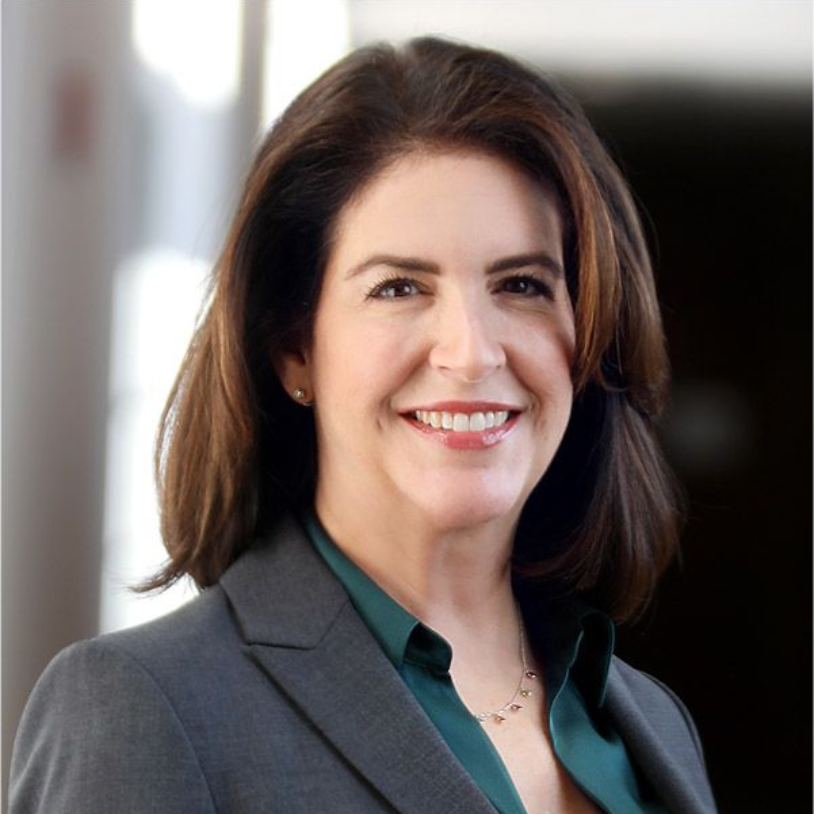
Diana is a commercial real estate and finance attorney licensed in RI and MA, recently listed in Forbes’ inaugural 2025 America's Best-in-State Lawyers publication. Diana is a certified Level 2X volunteer wildlife rehabilitator. She founded Ducharme Law LLC to continue her women-owned commercial law practice, and to expand her pro bono work in wildlife and broader animal welfare initiatives. A lifelong Rhode Island resident, Diana also serves on the Board of Directors for the Rhode Island Resource Recovery Corporation as well as the Board of Directors for the Rhode Island Free Clinic.
Diana shares her home with her human clan as well as various domestic rescue animals, including 2 parrots, 2 rabbits, a senior beagle-mix dog, a cat, and too many fish to count.
Decatur Foster
Board Member
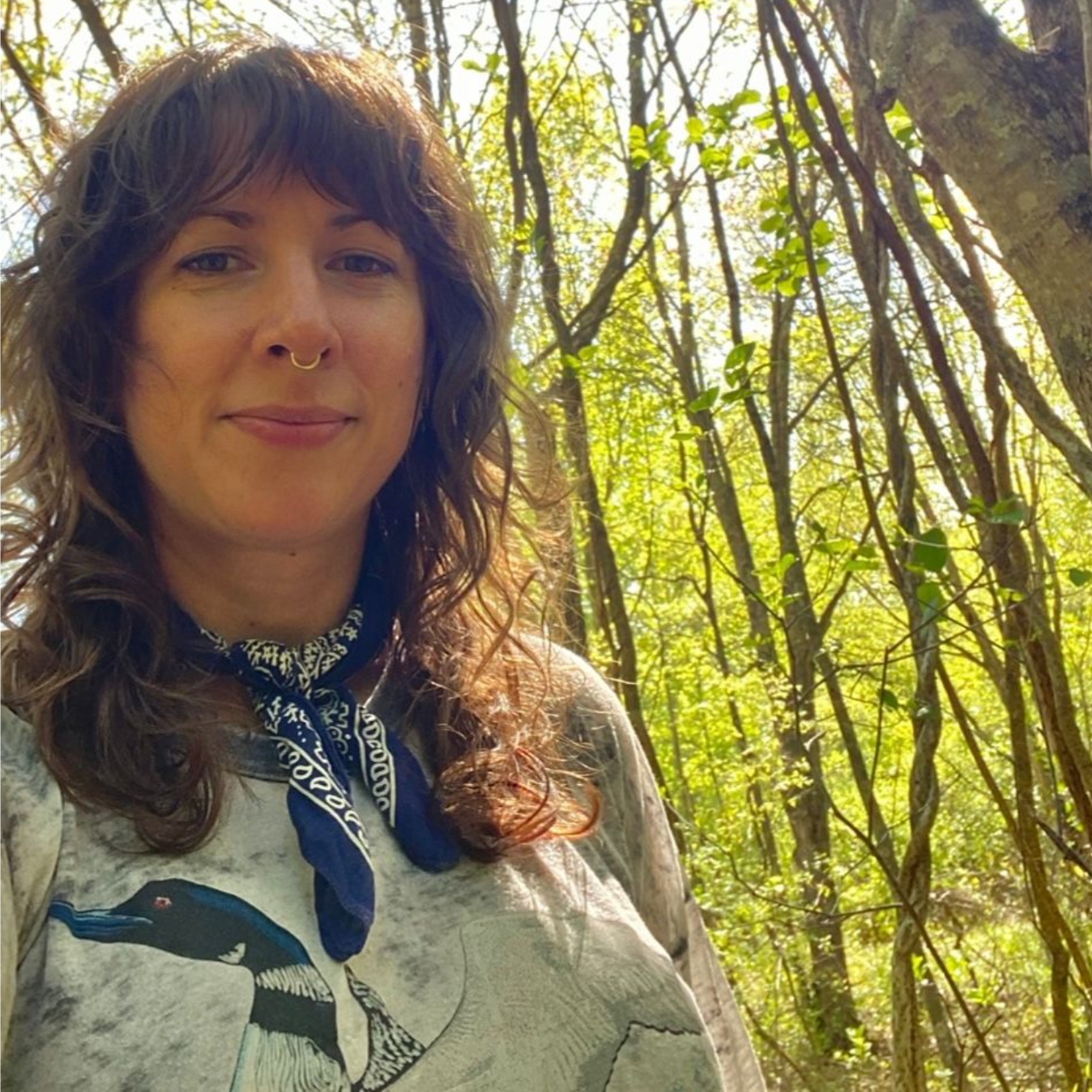
Decatur is a Conservation Biologist with the U.S. EPA, where their research focuses on the health and restoration of salt marshes, seagrass, and nutrient ecosystems within Narragansett Bay. Originally from the Pacific Northwest, Decatur holds a PhD in biology from Portland State University. Outside of a scientific laboratory, they are a metal artist who works with copper, brass, and silver to create textured jewelry—each piece inspired by the cells, organelles, and species they encounter.
Decatur became involved with Congress of the Birds in the spring of 2024, immediately aligning with the organization's commitment to the autonomy and innate wildness of birds.
Kim McCarthy
Board Member
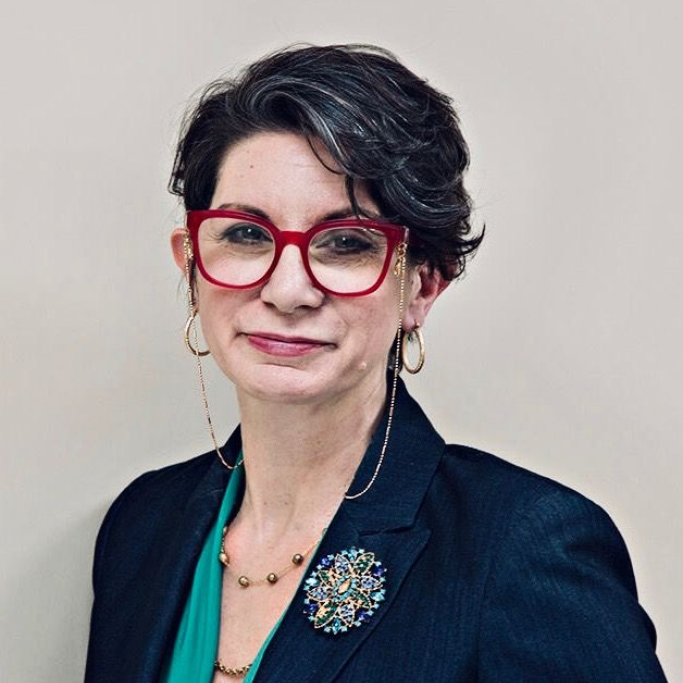
Kim is an ERISA, employee benefits, and tax attorney. She is a partner at Parker Brown Macaulay & Sheerin, a Rhode Island boutique law firm. During her professional career, Kim has received various honors and awards, including PBN’s 40 Under 40, PBN Leaders & Achievers, Tax Lawyer of the Year, and Best Lawyer in Rhode Island in four separate categories. Most recently, she was honored with the 2025 Rhode Island Bar Association Dorothy Lohmann Community Service Award.
Kim enjoys spending time with her family, traveling with her husband, and reading as many murder mysteries as she can.
Kate McPherson
Board Member
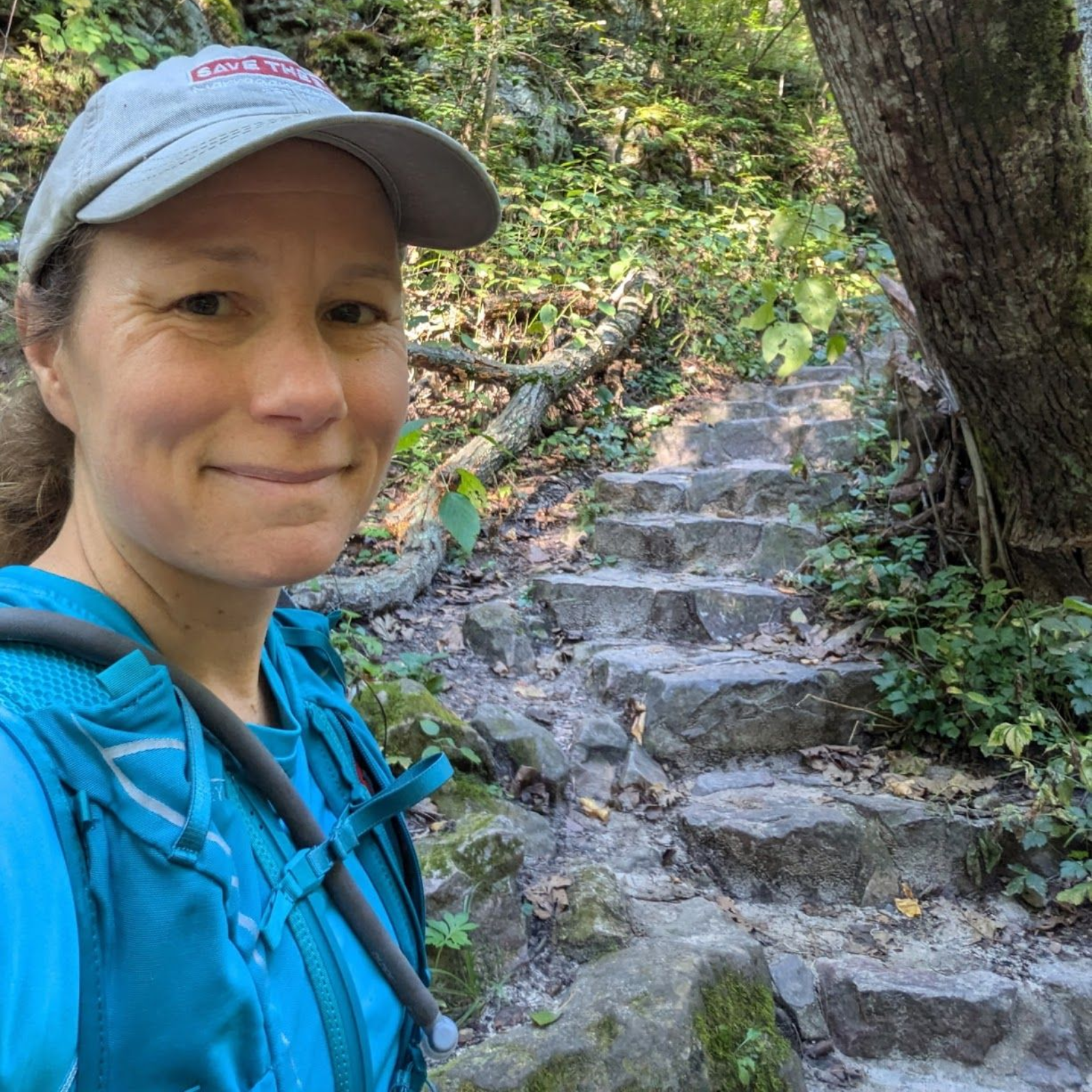
Kate is the Narragansett Bay Riverkeeper for Save The Bay where she is a voice for the forests, swamps, rivers and streams that flow to Narragansett Bay, but her first love has always been birds. She holds a BA in Wildlife Biology and Management from the University of Rhode Island where she focused her undergrad learning on birds in forests all over New England. She is a Professional Wetland Scientist with over 20 years of experience and also serves as Board President for the Blackstone Watershed Collaborative. Kate shares her home with three retired racing greyhounds and knows that hope is the thing with feathers.
Lexi Figore
Chief of Staff
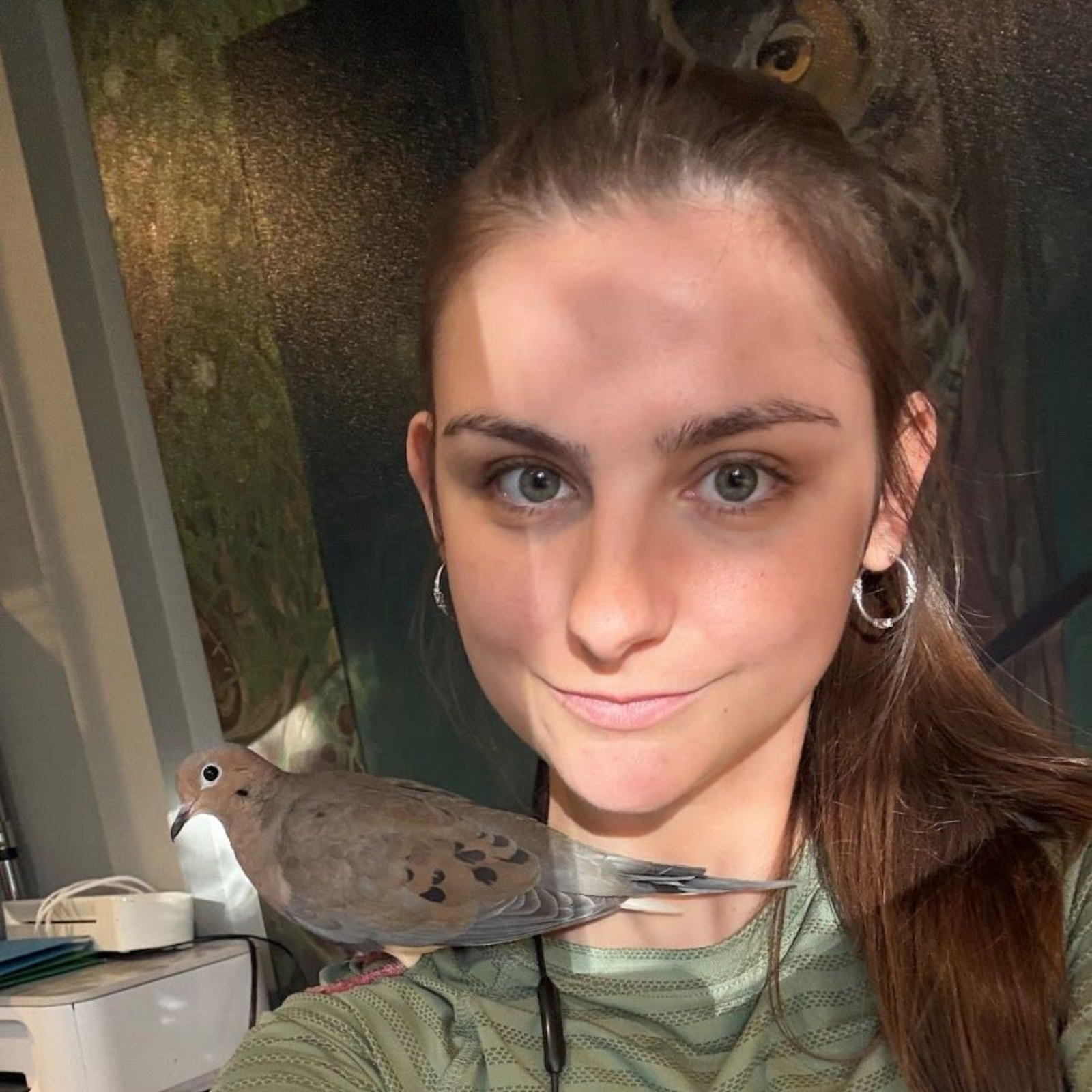
Lexi is a licensed wildlife rehabilitator and a registered nurse. She first came to Congress of the Birds in 2023 after bringing in an injured house sparrow, regularly volunteering before becoming the organization’s first full-time staff member. Lexi helps keep the clinic running day-to-day, coordinates intakes and care plans, trains new volunteers, and pitches in wherever steady hands and clear systems are needed.
Lexi’s work is grounded in a lifelong concern for how animals are treated and regarded. Working so closely with many different species has deepened her understanding of wild birds and affirmed her belief that animals are here with us, not for us.
Jen Chicoine
Director of Operations
Jen earned her Baking & Pastry Arts degree from JWU and is now the general manager of the beloved local gift shop Frog & Toad. A former equestrian and lifelong animal caretaker, she has always built her life around animals. Jen has been part of Congress of the Birds since the very beginning, helping keep all the moving parts running smoothly.
When she’s not at the clinic or Frog & Toad, you can find her on the couch with a glass of wine, her senior dog, Hunter, and her two prairie dogs, Pierogi and Cannoli.
Layla Farahbakhsh
Staff
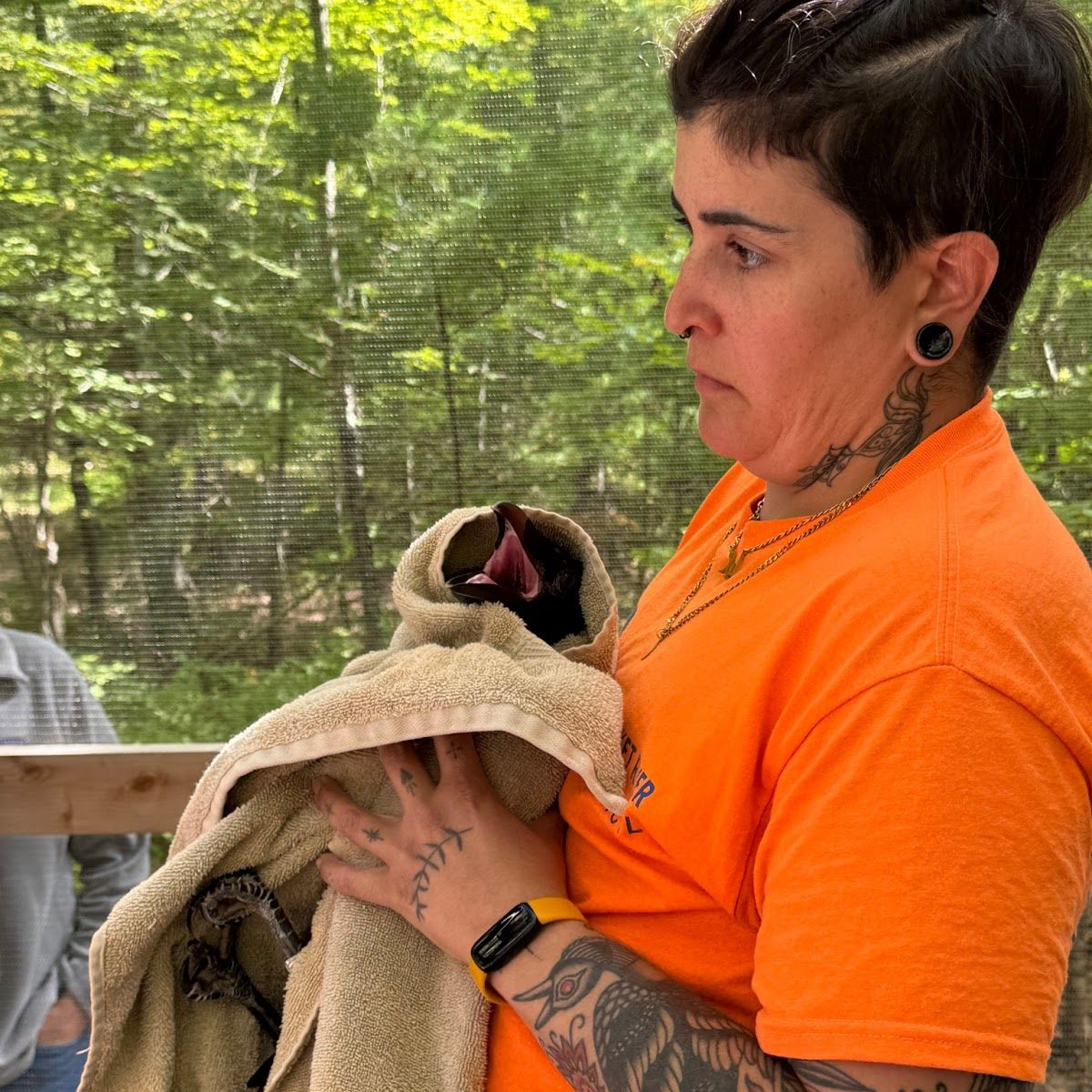
Layla is a career conservationist with a B.S. in Wildlife Conservation and over a decade of experience in bird surveys, hiking trail construction and volunteer leadership. Layla grew up north of Boston to Cuban and Iranian parents, and organizes with other BIPOC people to celebrate joy, art and build cross-cultural community. Layla is often outside, always looking for ocean ducks , and occasionally appearing as a drag king. They work in community urban forestry, and live with their fluffy cat, Ham.
Layla became involved with Congress of the Birds in the spring of 2024.
Jackson Watson
Staff
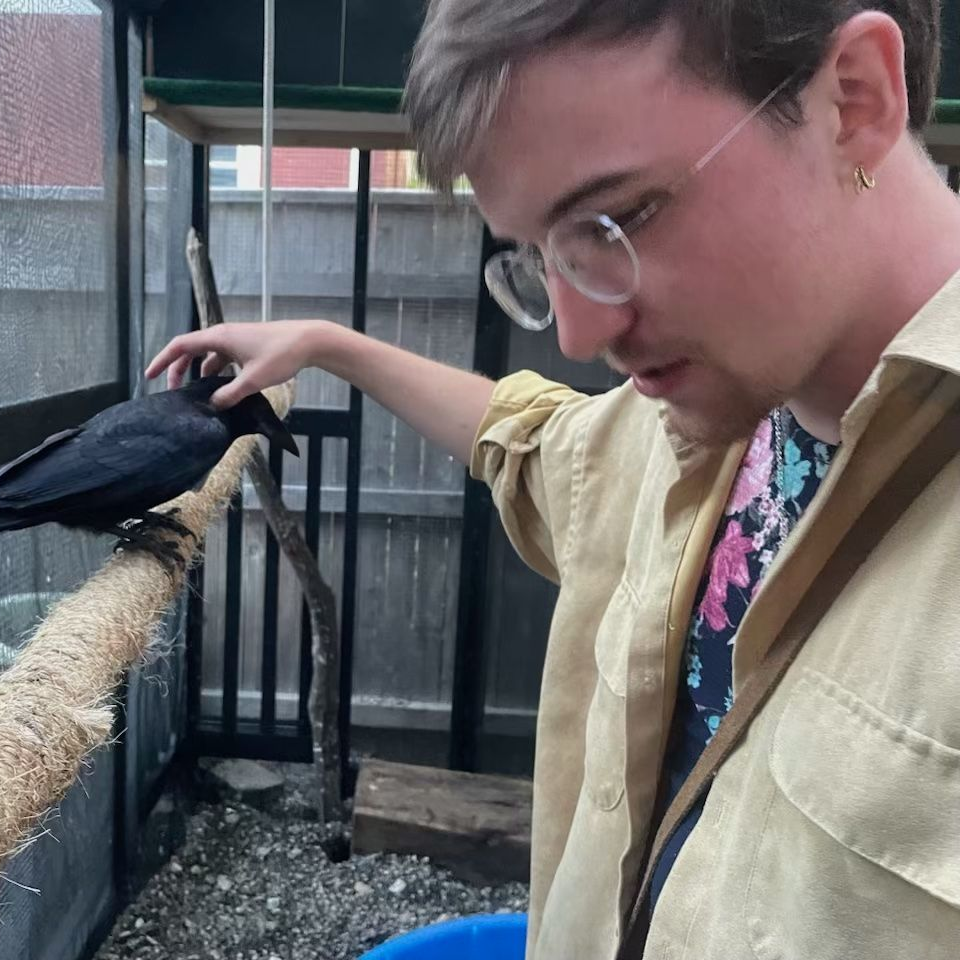
Jackson is a writer and translator from Georgia. They live in Providence now, where they work as a staff member at Congress of the Birds and serve as a poetry reader for Nat. Brut and Tyger Quarterly. Their writing is published or forthcoming in mercury firs, Fence, Poem-a-Day, and elsewhere. Whether working with birds at Congress, working with archival sources, or working on translations, they hope to augment life and keep it wild.
Jackson began working with Congress as a volunteer in 2023.
Hannah Proulx
Staff
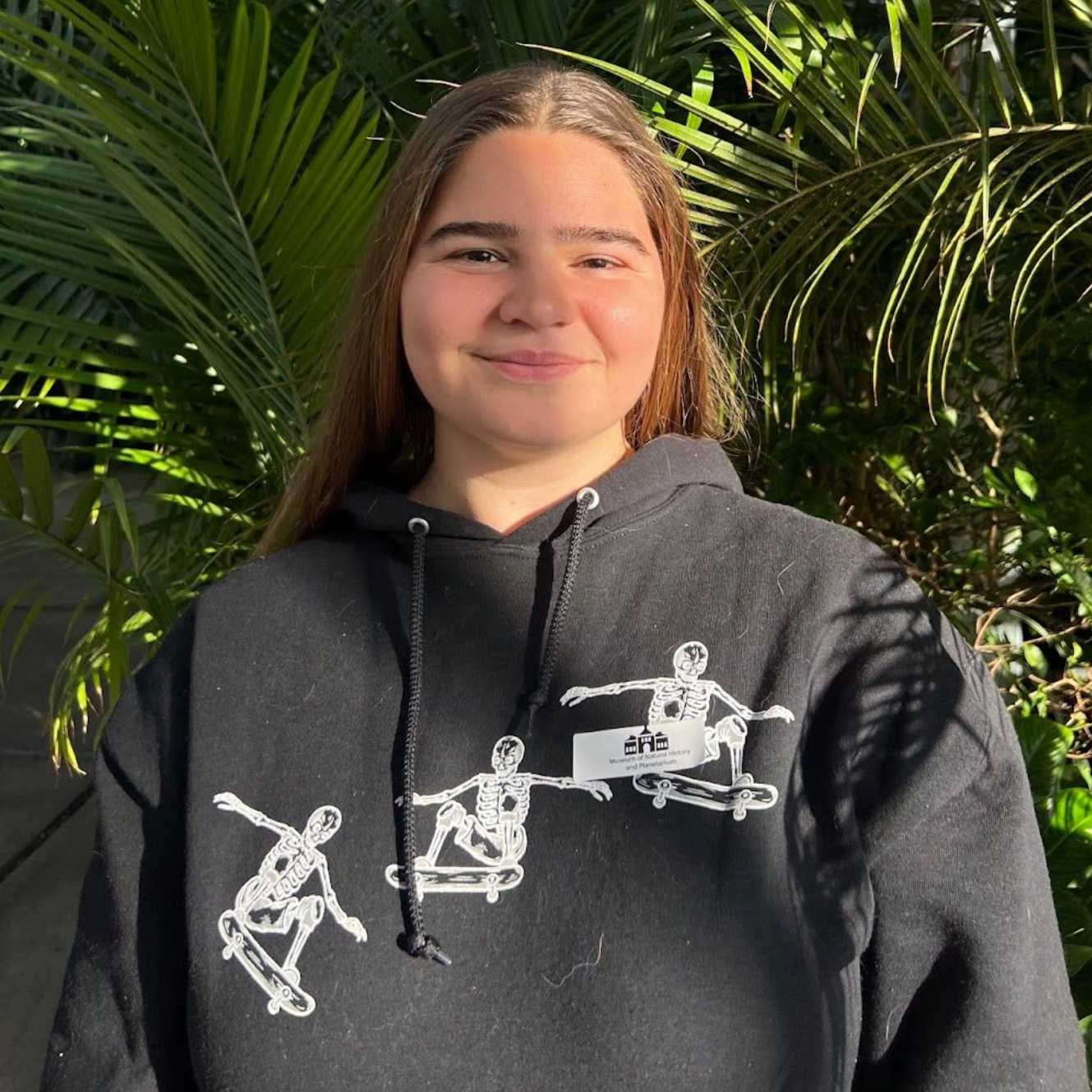
Hannah, a licensed wildlife rehabilitator, has worked in many industries, but wildlife conservation has always been her greatest passion. Originally a trapper for domestic bunnies and cats, she is known for assisting pet owners, animal control agencies across Rhode Island, and a number of other organizations.
Starting her journey as a volunteer in 2021, Hannah officially became a staff member in 2023 and is mainly called upon to contain and transport injured, orphaned, or sick animals to get the care they need. When not out in the field wrangling various creatures, you can find her at home with her bunny and cat, Basil and Guppy!

Meet Our Flock
Zola

Hatched in 2023, Zola is a common raven that arrived to us with clear indications that someone had attempted to keep her as a pet, and after being unable to care for her, set her loose. Every attempt was made to re-wild her, including pairing her with our other raven in care, but it became clear that she had already become habituated to humans in her time before coming to Congress of the Birds.
Zola is very talkative, and enjoys doing puzzles, caching her food in the slats of wood in her enclosure, and chasing balls!
Zia

In June 2023, Zia walked right up to the individual that found him and into a carrier. We assume that Zia, a common raven, had been raised by a human who had then attempted to ‘release’ him without proper knowledge of how corvids imprint upon people. When he came into our care, he was severely emaciated, with various metabolic issues from poor nutrition. Zia received months in care, and unfortunately our multiple attempts to ‘re-wild’ him were unsuccessful.
Now, Zia enjoys spending time with his ‘sister’ Zola, eating eyeballs, grapes, and ripping cardboard.
Sheida Soleimani
Founder / Executive Director

Sheida Soleimani is an Iranian-American artist, educator, activist, and federally and state-licensed migratory bird rehabilitator. She specializes in the care of all species of wild birds, and has rehabilitated thousands of patients over the past decade. Soleimani founded Congress of the Birds in the basement of her home, slowly growing it into a small but vital rehabilitation clinic; in 2024, it formally became a nonprofit dedicated to providing medical treatment, rehabilitation, and safe release for injured wild birds.
Her artistic practice runs alongside this work of care. The daughter of political refugees who fled Iran in the early 1980s, Soleimani uses photography, sculpture, and installation to examine the intertwined histories of violence linking Iran, the United States, and the broader Middle East. Her work is held in the permanent collections of the Guggenheim Museum, the Museum of Fine Arts Boston, the Pennsylvania Academy of the Fine Arts, the MIT List Visual Arts Center, and Kadist Paris. She is also an Associate Professor of Studio Art at Brandeis University.
Thalia Field
Board Secretary

Thalia is an American author known for innovative fiction and interdisciplinary literature. She teaches experimental fiction and interdisciplinary performance at Brown University, where she is the Adele K Seaver Professor of Literary Arts. Books include Personhood, Bird Lovers, Backyard and Experimental Animals: A Reality Fiction. Performance versions of her books directed and produced by Ben Williams can be found for free streaming at www.category-other.com
Thalia is a Founding Board Member of Congress of the Birds.
Jonathan Schroeder
Board Member

Jonathan is a historian and critic whose work focuses on the histories of human and nonhuman captivity. He teaches at the Rhode Island School of Design and is currently a fellow at the Harvard Radcliffe Institute, where he is writing an eleven-generation biography of Harriet and John Jacobs. This work expands upon his auto/biographical edition of John Jacobs’s lost 1855 freedom narrative, The United States Governed by Six Hundred Thousand Despots: A True Tale of Slavery, which was republished in 2024 and profiled in the New York Times, Boston Globe, All Things Considered, and elsewhere.
Jonathan is a co-founder of Congress of the Birds.
Zachary Rosemere
Board Chair

Long dedicated to environmental preservation, Zach holds a BS in Environmental Science and MS in Sustainability Science from UMass Amherst where he focused on renewable energy. Zach is a Project Developer for the RISE Group, installing solar PV for commercial, municipal, and nonprofit clients throughout the northeast.
Zach’s passion for wildlife and ecosystem health led him to Congress of the Birds, where he began as a volunteer in 2023.
Randelle Boots
Board Member

Randelle received her BA in Environmental Studies, with a minor in Economics and a Sustainability Certificate from Wellesley College. She went on to get a JD from Vermont Law School where she focused on environmental and energy law. Randelle now works as an attorney in the renewable energy and battery storage field for Black Bear Energy. Her volunteer has spanned organizations such as the Crisis Text Line, Handsome Dan's Rescue, and the Wildlife Rehabilitators Association of Rhode Island. Randelle enjoys exploring nature with her two nieces and two nephews and she has the most wonderful rescue pit-mix named Rose.
Cristina M DiChiera
Board Member

Cristina’s career spans over 25 years of leadership roles in nonprofit, government, and academic sectors. She has experience in every aspect of nonprofit management and is passionate about connecting people with resources to help them achieve their goals. She established her independent consultancy in 2017 to offer contract-based services, such as public art assessment and planning, project management, strategic planning, grant writing, marketing and communications. She is a founding member of the Urban Greens Food Cooperative and serves as a Trustee of Detroit Opera, an organization founded by her parents.
She lives in and cares for an old New England farmhouse on five acres in Foster, RI with her husband, daughter, a friendly dog and aggressive chickens.
Decatur Foster
Board Member

Decatur is a Conservation Biologist with the U.S. EPA, where their research focuses on the health and restoration of salt marshes, seagrass, and nutrient ecosystems within Narragansett Bay. Originally from the Pacific Northwest, Decatur holds a PhD in biology from Portland State University. Outside of a scientific laboratory, they are a metal artist who works with copper, brass, and silver to create textured jewelry—each piece inspired by the cells, organelles, and species they encounter.
Decatur became involved with Congress of the Birds in the spring of 2024, immediately aligning with the organization's commitment to the autonomy and innate wildness of birds.
Yvorn "Doc" Aswad
Board Member

Yvorn “Doc” Aswad, MD, MPH, is a native of Los Angeles, CA, but has called Providence, RI home since 2019. A pediatrician and child psychiatrist by training, his love for animals is what first brought him to the practice of science and medicine. With additional training as a public health practitioner, prioritizing the most vulnerable is the bedrock of his clinical practice and perspective to approaching care. These values align strongly with Congress of the Birds, for which he is a member of the board. Outside of work, Doc is an amateur vegan chef, an enthusiastic outdoorsmen, and a writer, of both science and fiction.
Diana Ducharme
Board Member
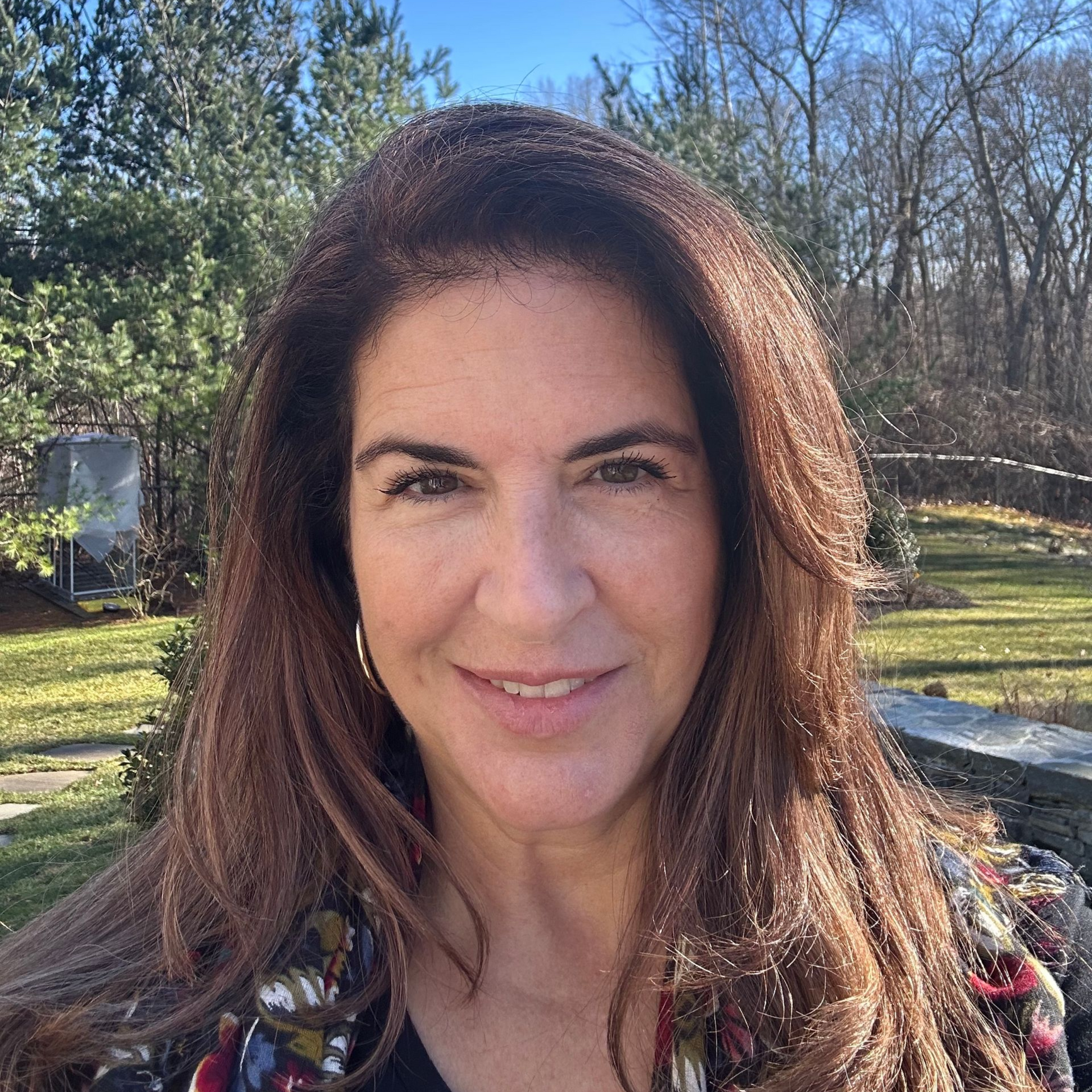
Diana is a commercial real estate and finance attorney licensed in RI and MA, recently listed in Forbes’ inaugural 2025 America's Best-in-State Lawyers publication. Diana is a certified Level 2X volunteer wildlife rehabilitator. She founded Ducharme Law LLC to continue her women-owned commercial law practice, and to expand her pro bono work in wildlife and broader animal welfare initiatives. A lifelong Rhode Island resident, Diana also serves on the Board of Directors for the Rhode Island Resource Recovery Corporation as well as the Board of Directors for the Rhode Island Free Clinic.
Diana shares her home with her human clan as well as various domestic rescue animals, including 2 parrots, 2 rabbits, a senior beagle-mix dog, a cat, and too many fish to count.
Kim McCarthy
Board Member

Kim is an ERISA, employee benefits, and tax attorney. She is a partner at Parker Brown Macaulay & Sheerin, a Rhode Island boutique law firm. During her professional career, Kim has received various honors and awards, including PBN’s 40 Under 40, PBN Leaders & Achievers, Tax Lawyer of the Year, and Best Lawyer in Rhode Island in four separate categories. Most recently, she was honored with the 2025 Rhode Island Bar Association Dorothy Lohmann Community Service Award.
Kim enjoys spending time with her family, traveling with her husband, and reading as many murder mysteries as she can.
Kate McPherson
Board Member

Kate is the Narragansett Bay Riverkeeper for Save The Bay where she is a voice for the forests, swamps, rivers and streams that flow to Narragansett Bay, but her first love has always been birds. She holds a BA in Wildlife Biology and Management from the University of Rhode Island where she focused her undergrad learning on birds in forests all over New England. She is a Professional Wetland Scientist with over 20 years of experience and also serves as Board President for the Blackstone Watershed Collaborative. Kate shares her home with three retired racing greyhounds and knows that hope is the thing with feathers.
Lexi Figore
Chief of Staff

Lexi is a licensed wildlife rehabilitator and a registered nurse. She first came to Congress of the Birds in 2023 after bringing in an injured house sparrow, regularly volunteering before becoming the organization’s first full-time staff member. Lexi helps keep the clinic running day-to-day, coordinates intakes and care plans, trains new volunteers, and pitches in wherever steady hands and clear systems are needed.
Lexi’s work is grounded in a lifelong concern for how animals are treated and regarded. Working so closely with many different species has deepened her understanding of wild birds and affirmed her belief that animals are here with us, not for us.
Jen Chicoine
Director of Operations
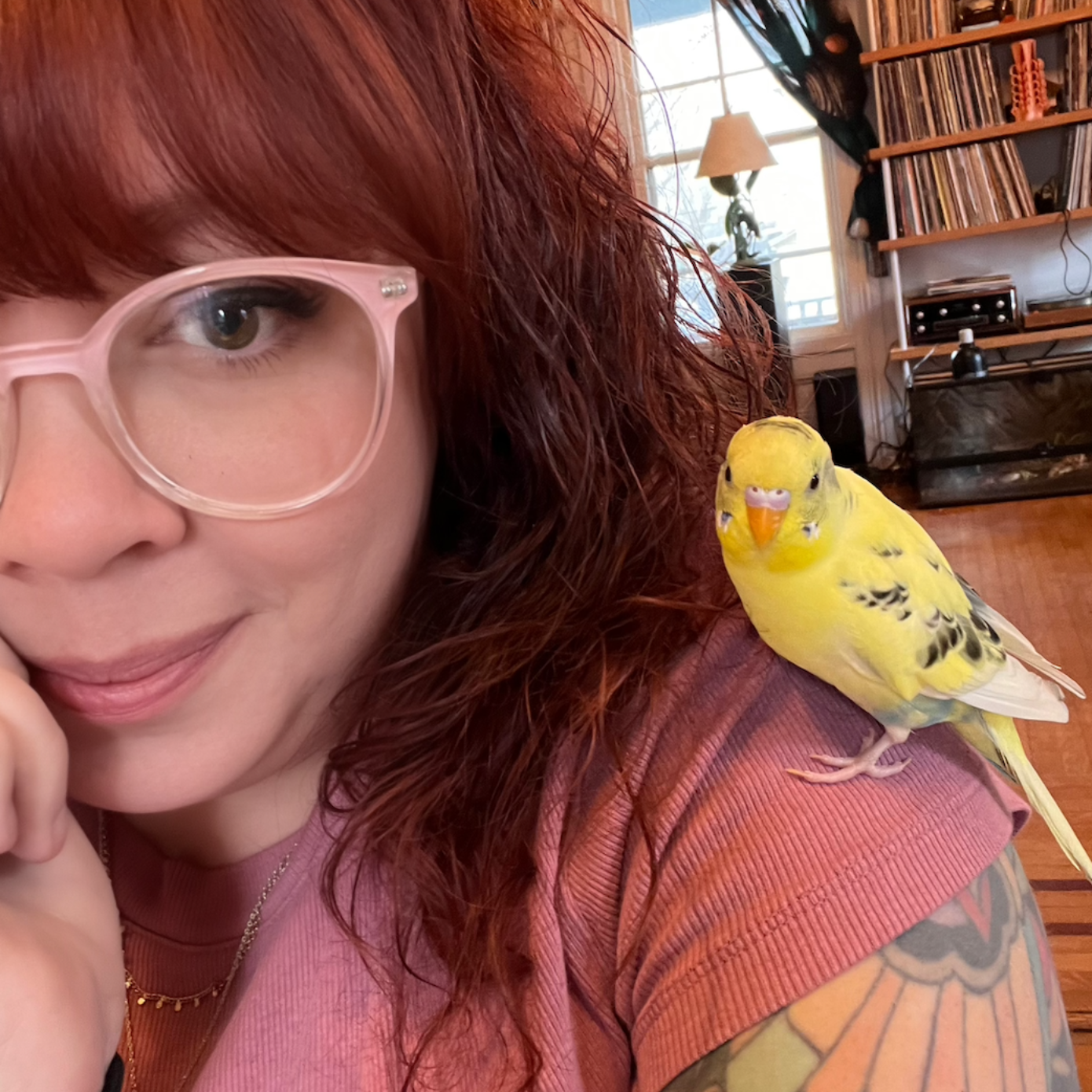
Jen earned her Baking & Pastry Arts degree from JWU and is now the general manager of the beloved local gift shop Frog & Toad. A former equestrian and lifelong animal caretaker, she has always built her life around animals. Jen has been part of Congress of the Birds since the very beginning, helping keep all the moving parts running smoothly.
When she’s not at the clinic or Frog & Toad, you can find her on the couch with a glass of wine, her senior dog, Hunter, and her two prairie dogs, Pierogi and Cannoli.
Layla Farahbakhsh
Staff

Layla is a career conservationist with a B.S. in Wildlife Conservation and over a decade of experience in bird surveys, hiking trail construction and volunteer leadership. Layla grew up north of Boston to Cuban and Iranian parents, and organizes with other BIPOC people to celebrate joy, art and build cross-cultural community. Layla is often outside, always looking for ocean ducks , and occasionally appearing as a drag king. They work in community urban forestry, and live with their fluffy cat, Ham.
Layla became involved with Congress of the Birds in the spring of 2024.
Jackson Watson
Staff

Jackson is a writer and translator from Georgia. They live in Providence now, where they work as a staff member at Congress of the Birds and serve as a poetry reader for Nat. Brut and Tyger Quarterly. Their writing is published or forthcoming in mercury firs, Fence, Poem-a-Day, and elsewhere. Whether working with birds at Congress, working with archival sources, or working on translations, they hope to augment life and keep it wild.
Jackson began working with Congress as a volunteer in 2023.
Hannah Proulx
Staff

Hannah, a licensed wildlife rehabilitator, has worked in many industries, but wildlife conservation has always been her greatest passion. Originally a trapper for domestic bunnies and cats, she is known for assisting pet owners, animal control agencies across Rhode Island, and a number of other organizations.
Starting her journey as a volunteer in 2021, Hannah officially became a staff member in 2023 and is often called upon to contain and transport injured, orphaned, or sick animals to get the care they need. When not out in the field wrangling various creatures, you can find her at home with her bunny and cat, Basil and Guppy!

